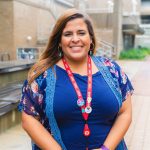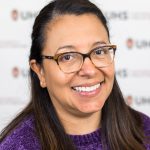University Health Services is proud to celebrate Latinx Heritage Month. We recognize and honor the enduring contributions and importance of Latinx students to our campus. We honor the many heritages and cultures of students from or with ancestors from the Caribbean, Spain, Central, and South America.
UHS supports and affirms all student identities. To meet the needs of our diverse student population, Spanish-speaking providers are available in Survivor Services for individual counseling and victim advocacy, individual counseling in Mental Health Services and Dígame sessions in Chican@ and Latin@ Studies (CLS), and the Primary Care and Women’s Health in Medical Services.
If English isn’t a student’s first language, it can be challenging to communicate health concerns or clinical terminology to a provider. Eliminating a language barrier is important to ensuring a student’s concerns are heard and they receive the appropriate treatment.

“The ability for students to request a provider who speaks Spanish creates room for clarity and easier communication,” says Mary Eldridge, a victim advocate and Survivor Services coordinator. “The reality is that there are some words for which there is no translation, and students feel like they’re being heard and understood.”

Claudia Marte, a Spanish-speaking provider in Mental Health Services, says it may be comforting for a Latinx student to talk with a provider who holds the same identity or has had similar life experiences.
“It gives a sense of trust,” says Marte. “It’s a positive thing for a student to see someone who looks like them in a space where they may not.”

Margarita Perez
Margarita Perez, a provider in the Women’s Health Clinic, says that the option to speak Spanish during an appointment can help ease anxiety. “Even for students who are proficient English speakers, they can be more comfortable speaking their first language, and it’s important to feel that way when talking with their provider.”
In addition to eliminating a language barrier, offering services in Spanish helps to reduce stigma. Eldridge says the focus on community and family is very ingrained in Latinx communities, and this can cause students to put their own needs aside to take care of their families.
“As a mental health provider who speaks Spanish, [these concerns are] something that could bring us closer because [the student] may not feel comfortable saying that out loud to somebody who’s not familiar with the culture or may not relate to it,” Eldridge says.

“Talking about mental health is difficult because it’s perceived as a weakness in some cultures and communities,” says Dr. Beatriz Lavell, a primary care provider. “Students may not want to be upfront about their concerns and then they hide them which can create more instability and anxiety.”
“One of the strengths of the Latinx community is resiliency,” Marte says. “The downside of that is that it doesn’t give you permission to feel badly if you are struggling with a mental health issue.”
Marte says some students may struggle with navigating between two cultures and asking themselves how they can be proud of their Latinx culture but still be proud to be an American.
Unique needs of Latinx students
Eldridge says many Latinx students that she meets with identify safety—physical safety, emotional safety, and financial safety—as significant concerns related to their student experience on campus. Eldridge adds that the current political climate weighs on some Latinx students, both for their individual well-being and out of concern for family members, some of whom come from different countries.
Students from marginalized communities can feel triggered if they feel their sense of belonging is questioned, such as if a student hears a slur.
“There are many ‘what if’s’ where students prepare for the worst possible outcome. When students are immersed in this type of climate, they can experience more anxiety.”
UW-Madison will not provide information on the immigration status of its students, faculty or staff unless required to do so under force of law. The Multicultural Student Center has online resources related to DACA/undocumented student support and the Dean of Students Office can support students as they process recent events or navigate campus services and resources. UHS providers do not ask students for their citizenship status.
“Students can come to see us without any fears,” Lavell says.
For students interested in utilizing UHS’s Spanish-speaking services, they can request a Spanish-speaking provider when they make an appointment. To make an appointment, call UHS at 608-265-5600 or log in MyUHS and request a Spanish-speaking provider in the notes section.